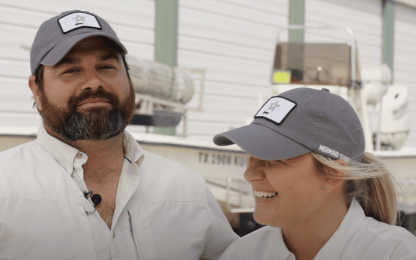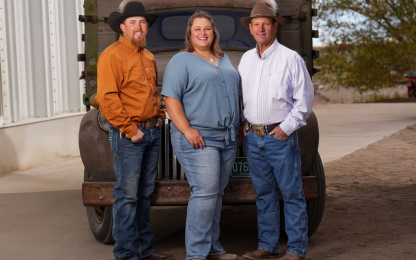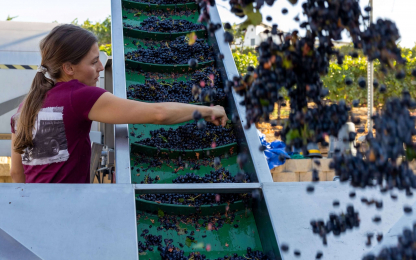A Sustainable Future
Isbell Farms stands as a testament to the rich history of rice farming in Central Arkansas, dating back to 1946 when Chris Isbell’s father first tilled the land. Today, Isbell Farms produces between 20 and 25 million pounds of rice annually, And it distinguishes itself through innovation.
For decades, the Isbell family has adopted practices that led to greater efficiency and sustainability in rice production.
“What makes Isbell Farms different from other rice farms in the area is their innovative nature,” said Josh Cunningham, Vice President of Lending at AgHeritage Farm Credit. “They are thinking all the time about how to make their operation better and what can they do to make it more efficient.”
Rice is often grown on sloped fields that depend on contour levees or terraces to maintain water depth at intervals down the slope of the field. However, Isbell Farms pioneered the idea to level their fields flat and employ zero-grade technology to decrease water and land use and find efficiencies. They are global leaders and have welcomed hundreds of visitors to their farm to see this technology firsthand.
Through zero-grade and alternative wetting and drying methods, Isbell farms uses half the water a farm typically uses, while decreasing methane emissions by 67 percent.
In addition to water conservation, Isbell Farms carefully monitors energy use. The family partnered with AgHeritage Farm Credit Services to install solar panels on the property in 2018. Since then, much of Isbell Farm’s energy use has been generated through this on-farm solar project.
“Figuring out a way to do things a little better is usually better for the environment and it’s also better for your pocketbook,” Chris said.
Premium Sake and Sushi Rice
Long before sushi rice became popular in the United States, Chris Isbell began producing Japan’s most prized sushi rice, Koshihikari, in Arkansas.
When this rice was first successfully produced on Isbell Farms in the late 1990s, media outlets across Japan took great interest.
“We had every television station that I can think of in Japan visit the farm,” Chris said. “It was all because they didn’t think that this rice could grow anywhere outside of Japan.”
Building on years of experience with Japanese rice varieties, Isbell Farms has shifted focus in recent years to even more unique varieties – including Yamada Nishiki, grown specifically for the making of sake.
“In 2008, I had lunch with Chris near his farm, and he told us that he was growing Yamada Nishiki, the best sake rice in the world,” said Ben Bell, Vice President at Origami Sake. “And I knew then that the potential for making great sake in Arkansas was there.”
Isbell Farms now provides specialty sake rice varieties to companies like Origami Sake and boutique brewers throughout the United States and other parts of the world.
“It’s fun to work and see rice growing in the state of Arkansas to be bottled and brought to the table of the consumer in the form of sake,” Josh said. “It’s another avenue for rice. It’s really exciting.”
Easing the Uncertainty
The Isbell family has been AgHeritage Farm Credit Services customers since 2004, and Chris appreciates having a lender like Farm Credit who has a deep understanding of agriculture and can help ease the uncertainty.
“In our farming world, people would have a 10-year plan, and with the Farm Bill coming out every five years and changing everything.” Chris said. “Farm Credit has been that cushion between that unpredictability. You can follow your dream and not be too expensive and not be too unpredictable.”


